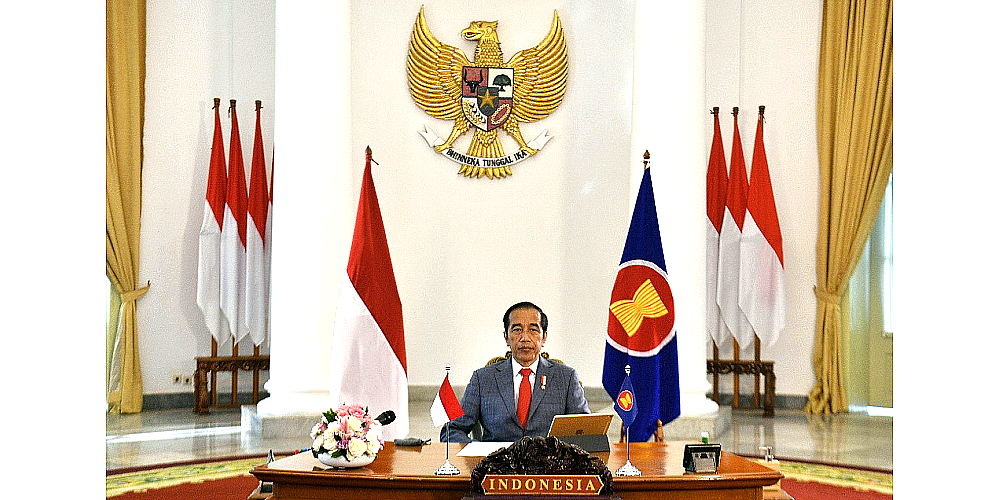
Indonesia made the point of attending the summit of the club of emerging economies known as BRICS in South Africa last week, but it politely turned down an invitation to join the group, which is expanding its membership to strengthen its hand in managing global economic affairs.
Given its size as the 16th largest economy in the world, Indonesia is more than qualified to join the group, which is known by the acronyms of its first five members: Brazil, Russia, India, China and South Africa.
Founded in 2010, BRICS has been seeking to reform the global economic system still heavily dominated by the West.
Indonesia shares many of the objectives that BRICS has set out to achieve, including the establishment of a more just global economic order and moving away from relying too heavily on the United States dollar for international transactions.
But it is in no rush to apply for membership, with President Joko “Jokowi” Widodo telling Indonesian reporters in Johannesburg that he had attended the summit to boost solidarity among the world’s developing nations.
Indonesia, he added, had not formally expressed interest in joining.
Instead, Indonesia sees its national interests best served by joining the Organization for Economic Cooperation and Development (OECD), the “rich men’s club” made up of 38 mostly Western countries.
If successful in its bid, Indonesia will be the organization’s third Asian member after Japan and South Korea.
Indonesia regained upper-middle income economic status this year, but the country has ambitions to make it to the world’s top-five largest economies before the middle of the century.
The OECD, rather than BRICS, is the route to get there.
A record of 60 countries attended the BRICS summit, many represented by their heads of government, including President Jokowi.
At the end of the gathering, BRICS announced it had admitted six new members: Iran, Saudi Arabia, Egypt, Argentina, the United Arab Emirates and Ethiopia.
It is not clear if they are going to change the name with the additional six new members.
The name was first coined in 2001 by Goldman Sachs in describing the four most promising emerging markets: Brazil, Russia, India and China.
Indonesia was not in its radar screen as it was then still reeling from the Asian financial crisis, and only gained the status of emerging economy toward the second half of the decade.
Leaders of these four countries turned Goldman Sach’s economic concept into a political entity by convening a summit in 2009.
In their second meeting in 2010, they invited South Africa to join, more to give it an African representation. BRIC became BRICS.
If they had gone by economic size, it should have chosen the larger Indonesia, although Jakarta would likely have turned down the invitation.
In the years since then, BRICS has sent its representatives to encourage Indonesia to join or participate in its summit. Indonesia has politely turned them down.
A wise decision given the uncertainties about where BRICS is heading amid concerns that BRICS is turning into an anti-West group led by China and Russia.
This year, Indonesia finally accepted the invitation to attend the summit, but with Jokowi quickly playing down any talks of joining.
In his speech before BRICS leaders, Jokowi said he had come to represent the 85 percent of the global population in the Global South which wants a “win-win” formula.
This is the same role he assumed when Indonesia chaired the Group of 20 largest economies in the world last year.
In his speech Jokowi was singing the same tune as BRICS when he said, “The world economic order today is unjust, the development gap is widening, and more people are becoming impoverished and hungry. We cannot let this situation go on.
“Developing countries must unite to fight for their rights. We must reject trade discrimination and no one can stop our efforts at developing our downstream industries,” he said.
The last part was an indirect reference to the ongoing row Indonesia has with the US and the European Union at the World Trade Organization over Indonesia’s policy of banning exports of several minerals to develop its own downstream industries.
“We must continue championing equal and inclusive cooperation. BRICS can be on the frontline fighting for just development and reform to build a just world order,” Jokowi said.
He fell short of mentioning names in contrast to his speech in Jakarta in 2015 when he called on African and Asian nations to strive for a new world economic order and end the domination of some countries over the global financial architecture, because the World Bank and the International Monetary Fund could not be expected to provide the solutions.
BRICS is also in the initial stages of exploring the use of local currencies for transactions between member states, reducing their reliance on the US dollar which has become volatile in recent years with the weakening US economy.
Indonesia is already doing this on a small scale with its Southeast Asian neighbors.
While Indonesia shares many of BRICS’ goals, for now, it is pursuing its own path, different from the other major emerging economies.
A wise decision given the uncertainties about where BRICS is heading amid concerns that BRICS is turning into an anti-West group led by China and Russia.
Besides, all the BRICS countries are having major economic problems, thus raising questions about the group’s effectiveness in championing global economic reforms.
But if Indonesia finds that it is in its national interests to jump on the BRICS bandwagon, it will have no trouble adjusting and making its contribution to the cause.
A source close to Jokowi shared that Indonesia’s offer to join BRICS was conveyed to the Coordinating Maritime Affairs and Investment Minister Luhut Binsar Pandjaitan during his visit to South Africa in July 2023.
The proposal was later discussed with President Jokowi, Finance Minister Sri Mulyani, and Foreign Minister Retno Marsudi.
“Two ministers disagreed in Indonesia joining,” said the source.
The same source mentioned that the ministers who rejected the BRICS proposal argued that the coalition is fragile due to a lack of unity among member countries.
For instance, India and China are embroiled in border conflicts.
Russia’s presence in the grouping is also deemed a liability following its invasion of Ukraine.
Joining this alliance would position Indonesia as aligning with specific political blocs, contradicting Indonesia’s free and active foreign policy, the source said.
Economic factors are also being considered. Individuals within the President’s circle said Indonesia would not gain much benefit from joining BRICS.
Instead, the alliance would benefit from Indonesia, thanks to its huge population.
“Indonesia ultimately did not return the letter of intent and did not declare joining BRICS,” the source said.
ADVERTISEMENT
ADVERTISEMENT








































